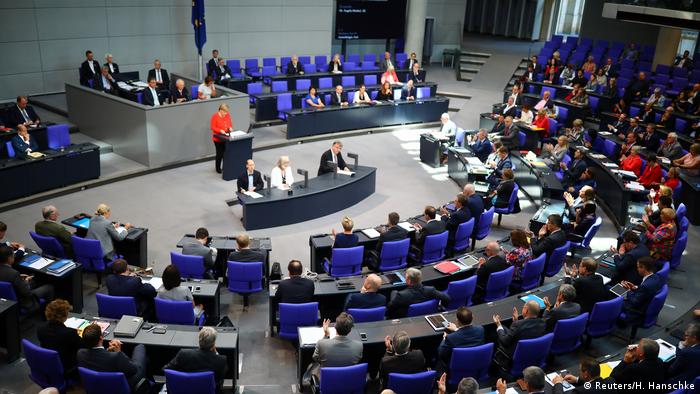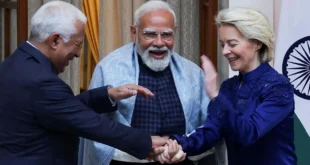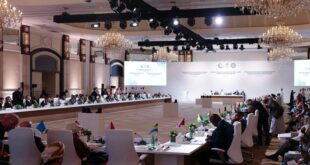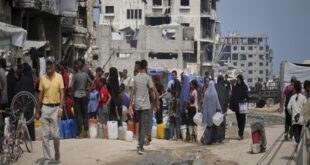
Climate, migration, and the euro: Which issues has the Bundestag debated the most since 2005?
Coronavirus. This word was first heard in Germany’s lower house of parliament, the Bundestag, on the afternoon of February 12, 2020.
« Dear colleagues, the outbreak of the coronavirus in China is now having a worldwide impact, » said Health Minister Jens Spahn as he began his speech to lawmakers.
A few COVID-19 cases became a worldwide pandemic, and Germany alone has seen 90,000 virus-related deaths. In the Bundestag, lawmakers have debated lockdowns and their loosening, masks, and vaccine priorities. Again and again, one word was heard: coronavirus.
How often exactly? Bundestag transcripts show the tally. By the end of Germany’s 19th legislative period in June 2021, members of parliament had talked about the virus more than 10,000 times.

The word came up the most often on May 14, 2020, as lawmakers debated laws to stop the spread of the virus and financial compensation for those hit by the COVID-related economic slowdown. The pandemic has become one of the reigning political issues in Germany, and the last big crisis of the Merkel era.
The plenary transcripts of the Bundestag document how, before the pandemic, three crises have dominated debate since Merkel became chancellor in 2005: climate breakdown, the global financial crisis that began in 2007, and the arrival of hundreds of thousands of refugees, mostly from Syria.
« It was the finance- and Euro-crisis that plagued Chancellor Merkel’s time in office the most, » said Merkel biographer Ursula Weidenfeld. « Because at the end of the day, it revolved around the question: how do you hold Europe together? And what role does Germany play in that? »
The many parachutes of the financial crisis
Merkel regularly had to come before parliament to defend what she called financial « parachutes » to save countries like Greece, Portugal, and Ireland from bankruptcy. Different forms of financial assistance were discussed more than 2,000 times in the Bundestag during her time as chancellor.
« If the euro collapses, Europe collapses, » she said on May 19, 2010.

At this time, her government and the parliament were very closely aligned. « That’s how we got through the financial crisis relatively quickly, » remembers finance policy expert Hermann Otto Solms, who’s been a member of the Bundestag for over forty years with the pro-free market Free Democrats (FDP).
However, in the years that followed there were many times Merkel had to push her own center-right Christian Democrats (CDU) to vote to supportemergency financial assistance because Germany would also have faced dire consequences if a eurozone country had defaulted on its debts.
The discord amongst the conservatives had its consequences. « One cannot forget that out of the resistance to the chancellor’s policy of rescuing other eurozone countries came the AfD, a political power to the right of the CDU, » said Ursula Weidenfeld, referring to the far-right populist Alternative for Germany party.

Millions fleeing conflict presents Germany’s next challenge
Founded in 2013, the AfD would however not find its guiding political principle until 2015 when the number of people fleeing conflict, particularly from Syria, and seeking refuge in Germany rose sharply. Nearly one million refugees came to Germany within one year.
‘Syria’ quickly became one of the most-used words in the Bundestag debates. On a single day, December 4, 2015, it was said more than 600 times. This was the day parliament authorized the German army, the Bundeswehr, to join the fight against the so-called « Islamic State. »
In August of that year, Merkel famously said « we can do this! » in reference to taking in the many refugees who were arriving in the country. The AfD made opposition to her open-door policy its central tenet. Two years later, this helped propel them to their debut in the Bundestag.
According to Hermann Otto Solms, having the AfD in parliament hasn’t been completely negative, saying that « robust debate » is good for the Bundestag, and « shows voters that we are looking for the best possible solutions. »
The term « integration » comes up most often in the parliamentary session of February 25, 2016 (around 350 times), together with the words « refugee » (around 380 times) and « asylum » (around 360 times). At the end of the debate, the Bundestag tightened the asylum law and restricted the reunification of families.

Looking to the future: the climate crisis
But the topic that has preoccupied the Bundestag the most during Merkel’s time in office is undoubtedly climate change. The phrase « climate protection » was said at least once in 80% of parliamentary sessions while she was in charge. This means it came up in 768 of 958 sessions.
Merkel spoke directly about the need to avert environmental disasterwhen she first took up her post in November 2005, saying it was a challenge for the country’s economy. She promised to adhere to the Kyoto Protocol of 1997 and to undergo international trips with climate protection in mind. She said she wanted Germany to be the « top exporter in the world » of green technology and know-how.

A year later, she posed in her hiking jacket before a melting glacier. But in the intervening years, her reputation as the « climate chancellor » has largely diminished. Despite over 12,000 mentions of climate change in the Bundestag during her tenure, the few laws passed promoting renewable energy and other measures to protect the environment have been widely criticized as too little, too late, by many experts and activists.
When catastrophic floods stuck western Germany in July 2021, Merkel acknowledged that more had to be done, but stopped short of accepting responsibility. « We have not reached our goals, » she said, « we have to pick up the tempo. »
The environment, especially Germany’s plan to stop using coal for energy by 2038 at the latest, is one of the biggest issues in the campaign ahead of the country’s federal election on September 26.

World Opinions – DW ENG




 World Opinion | Alternative Média زوايا ميادين | صوت من لا صوت له Débats De Société, Questions, Opinions et Tribunes.. La Voix Des Sans-Voix | Alternative Média
World Opinion | Alternative Média زوايا ميادين | صوت من لا صوت له Débats De Société, Questions, Opinions et Tribunes.. La Voix Des Sans-Voix | Alternative Média




